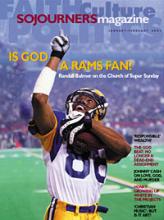In the Old Testament lesson at my church one Sunday, we read, "Pray for the peace of Jerusalem....May there be peace within your walls and security within your citadels," even as bloodshed continued to bring sorrow to that holy city. Like many churches, we also prayed for wisdom and strength for our president, who would that afternoon fly to the Middle East to see if some reconciliation could be reached. Unlike other churches, however, we had a congregant for whom these words held special meaning, a man who most Sundays sits in the third pew from the front on the right-hand side, just another member of the congregation and yet always more — President Bill Clinton.
Should Clinton cease being the president when he enters Foundry United Methodist Church? Should he cease being a Christian when he engages policy challenges in the White House? Public opinion seems to support the idea that a president's faith should inform the way he approaches decision-making. Problems arise, however, when what is religiously right is not only politically unpopular, but perhaps even politically impossible. This is one of many tensions at the heart of Stephen Carter's latest book, God's Name in Vain.
The intersection of religion and politics raises concerns and challenges for people throughout society, from the president to grassroots activists to lay people. In God's Name in Vain, this Yale law professor attempts to answer the question raised, but left unanswered, by his 1993 book The Culture of Disbelief: "If religion is to be actively involved in politics, what is the proper form of that involvement?"
Read the Full Article
